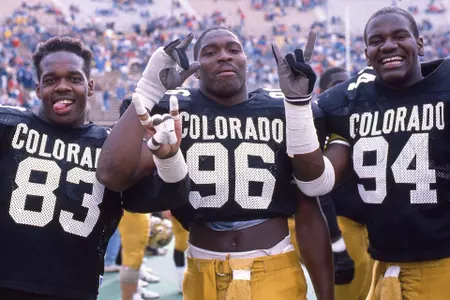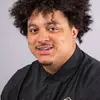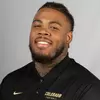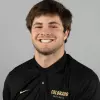
Houston’s Lasting Impact on Colorado Football
September 12, 2025 | Football
BOULDER-From Space City to the Rocky Mountains, Houston has sent some of its brightest stars to shine in black and gold, leaving a legacy at Colorado that spans generations.
CU's impact from Houston is deep and undeniable. In the 1960s, it began with Bill Collins, CU's first Black captain. His story resurfaced recently when Collins passed away on July 31 and was honored at Folsom Field, where his family joined the pregame coin toss. In the 1969 Liberty Bowl, Collins stood alone at midfield against still-segregated Alabama, while the Crimson Tide sent dozens of players as an intimidation tactic. It didn't work—Colorado rolled to a 47–33 win.
A few years later, the Buffs were graced with perhaps the fastest player ever to wear the black and gold: Cliff Branch. One of the most electrifying athletes in school history, Branch set NCAA records as a returner and then turned heads on the track, blazing to a 10-flat 100-meter dash before embarking on a Hall of Fame NFL career with the Oakland Raiders.
Branch's teammate, fellow Houston native JV Cain, was a gifted tight end and the seventh overall pick in the 1974 NFL Draft. Cain's promising career with the St. Louis Cardinals was cut short in 1979 when he collapsed and tragically died of a rare heart condition during training camp on his 28th birthday. The Cardinals retired his No. 88 in his honor.
When Bill McCartney began rebuilding Colorado into a national contender in the late 1980s, Houston was a recruiting priority. The program landed defensive linemen Art Walker, Kanavis McGhee, and Alfred Williams—the famed H-Boys—who combined for seven All-America seasons, a Butkus Award, and a spot in the College Football Hall of Fame. They anchored what many still consider the most dominant team in CU history, the 1989 squad, and helped bring home the 1990 national championship.
The Houston pipeline continued into the 1990s with Thorpe Award winner Chris Hudson, who remains on the ballot for the College Football Hall of Fame. In the 2000s, Gary Barnett kept the connection alive, bringing in All-Pro safety Michael Lewis, five-time Pro Bowl offensive lineman Andre Gurode, another NFL linebacker in Brian Iwuh and fan favorite Lawrence Vickers. Vickers' bruising style was so unique that CU invented a new position for him—the V-back—and his iconic body slam of a CSU Ram after scoring a touchdown remains a highlight-reel favorite.
Houston ties extend well beyond the stars. Koy Detmer, CU's mid-90s quarterback, has coached high school in the city. Other Houston natives that made their mark include, but certainly aren't limited to, Cedric Cormier, Akarika Dawn, Javier Edwards, Frank Filip, DeAndre Fluellen, Edwin Harrison, Maurice Henriques, Chidozie Nwankwo, Deion Smith, Mike Spivey. Even today, the roster has Houston ties. Freshman WR Quanell Farrakhan Jr., who made his college debut last week, calls Houston home. Tavian Coleman is from Humble, Texas, a Houston suburb, and Ryan Staub has family roots in the Houston area.
From Collins breaking barriers to Branch redefining speed, from the H-Boys powering a national championship to modern-day Buffs chasing their own legacies, Houston's influence on Colorado football has been steady and profound. It's a bond that connects Space City with the High Country—a long line of athletes who left Houston and carried its pride to new heights in Boulder.





